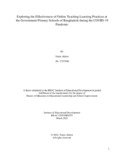| dc.contributor.advisor | Jahan, Israt | |
| dc.contributor.author | Akhter, Narjis | |
| dc.date.accessioned | 2022-09-11T04:04:17Z | |
| dc.date.available | 2022-09-11T04:04:17Z | |
| dc.date.copyright | 2022 | |
| dc.date.issued | 2022-03 | |
| dc.identifier.other | ID: 17357040 | |
| dc.identifier.uri | http://hdl.handle.net/10361/17185 | |
| dc.description | This thesis is submitted in partial fulfillment of the requirements for the degree of Masters of Science in Early Child Development, 2022. | en_US |
| dc.description | Cataloged from PDF version of thesis. | |
| dc.description | Includes bibliographical references (pages 42-45). | |
| dc.description.abstract | This study is about how online education is assisting students in government primary schools in
Bangladesh during the pandemic and whether it is effectively assisting students in meeting their
goals. The study was carried out to find out how distance learning, also known as e-learning,
electronic learning etc.is helping the students to meet their pedagogic needs and fulfill the criteria
needed for effective online schooling. To analyze the efficiency of online classes amidst the
pandemic, GPSs from the marginalized communities of the Rayerbazar area have been chosen to
represent the fragment of the educational crisis the nation is suffering from. In this regard, the
following study was carried out in four Government Primary Schools from the Razyerbazar area
of the capital. The catchment area that these four GPS covers are primarily within the zone of the
urban slums of Dhaka city. The targeted population were comprised of stakeholders who are
primarily affiliated with the Government Primary Schools, namely students, teachers and head
teachers. The findings from this study suggests that the students and teachers who were
interviewed came into a common consensus that they prefer physical classes over online classes,
however even if online classes were not the best mode of schooling, it was still the next best
alternative and preferable rather than sitting idle at home during the lockdown imposed by the
pandemic. Lack of adequate technological devices like smart-phones, laptops, desktops and
expensive data packs were some common obstacles from the student’s side. On the other hand, the
teachers expressed their challenges regarding not receiving adequate training to effectively
conduct online classes, unsatisfactory attendance from the students, and lastly, lack of proper
technological devices. However, one of the key findings of this study is that although there are
various obstacles that students and teachers face when teaching online learning, the good news is
that conducting lessons online is without a doubt a laudable move adopted by the present
administration to prevent students' academic activities being lost. Online classes are a next best
alternative to physical classes, even though the entire system of online classes does not have the
potential to out rightly remove the existence of physical class altogether. Online classes were
helpful but it was not always feasible and quite expensive. | en_US |
| dc.description.statementofresponsibility | Narjis Akhter | |
| dc.format.extent | 48 Pages | |
| dc.language.iso | en_US | en_US |
| dc.publisher | Brac University | en_US |
| dc.rights | BRAC University thesis reports are protected by copyright. They may be viewed from this source for any purpose, but reproduction or distribution in any format is prohibited without written permission. | |
| dc.subject | Online Teaching Learning Practices | en_US |
| dc.subject | Government Primary Schools | en_US |
| dc.subject | COVID-19 Pandemic | en_US |
| dc.subject.lcsh | Internet in education | |
| dc.subject.lcsh | Computers and literacy | |
| dc.title | Exploring the effectiveness of online teaching learning practices at the government primary schools of Bangladesh during the COVID-19 Pandemic | en_US |
| dc.type | Thesis | en_US |
| dc.contributor.department | Institute of Education Development, BRAC University | |
| dc.description.degree | M. Early Child Development | |

